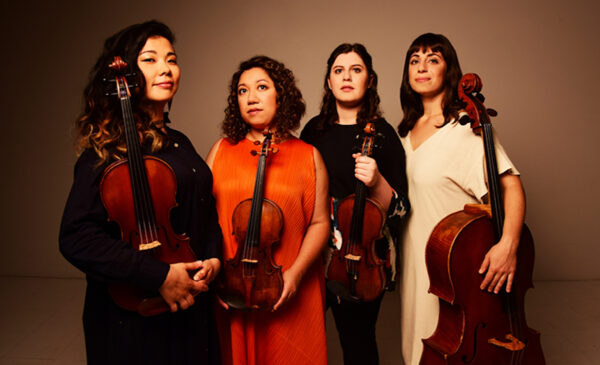Classical Concert Review: The Aizuri Quartet — A Stellar Unity
By Aaron Keebaugh
From beginning to end, the Aizuri Quartet’s performance delivered invigorating delights.

The Aizuri Quartet — the group’s explored turbulence, intimacy, grace, and all things in between. Photo: courtesy of the artist.
To say that great string quartets perform like friends engaged in conversation may be a well-worn cliché. But the Aizuri Quartet plays together with such finesse that they can practically finish each other’s sentences.
By exploring turbulence, intimacy, grace, and all things in between, the all-female Aizuris glorified music by Tanya Tagaq, Bela Bartók, Clara Schumann, and Franz Joseph Haydn in their Celebrity Series debut Wednesday night at Longy’s Pickman Hall.
Even in a town that has seen a wide variety of visiting quartets, the Aizuris stand apart. Gentle attacks culminate in a mesmerizing intensity that unfolds with natural flair. And they see-saw between sudden shifts in timbre with stellar uniformity. More than a mere collective, this foursome is an exponential sum of its distinctive parts.
In Tanya Tagaq’s Sivunittinni, the Aizuris transformed scratchy sonorities into an arresting play of rhythms. Tagaq wrote this compelling score for the Kronos Quartet’s “50 For the Future” project. Over nine minutes, the strings whistled, moaned, and grooved together in driving heavy-metal riffs.
Bartók’s String Quartet No. 4 offered an introspective contrast. The Aizuris took an unexpectedly soft approach to the wild accents that frame the first movement’s chromatic lines. And the delicacy paid off — intermittent phrases tinged with glassy resonance that still carried the momentum forward.
In the night music—a Bartók trope—the silvery grain of Karen Ouzounian’s cello generated hushed agitation. The full ensemble tore through the Prestissimo and Allegretto with the verve of a village band. The final Allegro was infused with a furious fire.
But the Aizuri Quartet is equally capable of congenial warmth. The harmonies of Ouzounian’s arrangement of Clara Schumann’s “Ich stand in dunkeln Träumen” beamed and shimmered through each hymn-like strand.
So did Haydn’s String Quartet, Op. 76, No. 4. The musicians embraced the piece’s charm and gaiety, their golden blend giving way to fleeting mystery in the Allegro con spirito. The Adagio unfolded in a deft dialogue between varied textures: the approach was lyrical yet thoughtful, never becoming dry or stiff. The Minuet lilted playfully; wide intervals of the Trio evinced a bucolic grandeur. Here, too, the group’s gentle touch enhanced the titillating zeal of the music — the finale churned with quiet intensity.
From beginning to end, this performance delivered invigorating delights. The program will be streamed this evening via the Celebrity Series. I’m planning to log in at 8 p.m. to hear it again.
Aaron Keebaugh has been a classical music critic in Boston since 2012. His work has been featured in the Musical Times, Corymbus, Boston Classical Review, Early Music America, and BBC Radio 3. A musicologist, he teaches at North Shore Community College in both Danvers and Lynn.
